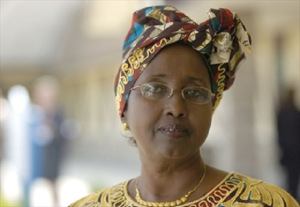
Sadia Gassim of Kitchener Born: Aug. 6, 1955 in Mogadishu, Somalia Died: July 28, 2015 of pancreatic cancer
As an immigrant from the war-torn Somalia of 1993, Sadia Gassim not only embraced Waterloo Region as her new community but she prompted conversations about racism and created new ways to celebrate African culture. Sadia died of cancer on July 28 just a week before her 60th birthday, but her legacy has been firmly set on both sides of the globe.
“I am truly sorry to hear of her passing and that we in Waterloo Region will no longer have her as an advocate of the Black/African community,” said Marcia Smellie, president of the Congress of Black Women of Canada, Waterloo Region Chapter. “She was such a strong believer in women coming together and organizing for themselves and for the needs of their community.”
The list of Sadia’s accomplishments was long. Former president of the African Women’s Alliance, she was also part of Worldwide Opportunities for Women, or WOW. In 2008 she received the Marie Seiler-Linden Inspiring Women award at the Inspiring Women: The Experience conference.
After that honour Sadia told The Record “I feel very proud, people like me can have a voice. If I inspire one person, I am grateful.”
Along with University of Waterloo sociology associate professor, Alicja Muszynski, Sadia created Celebrating Diversity in Waterloo Region, a program designed to empower African refugees and immigrants. She was also a key organizer of the annual Afro Fest in Waterloo Park.
In Africa, Sadia had launched a project to build a school in Kenya, which has been on hold since her death. Her determination to help others also led the former scientist to switch her focus to the PhD program in social work at Wilfrid Laurier University.
Sadia’s is a remarkable story, one that begins with her father, a man who had risen from poverty to become a beloved medical doctor.
Her brother Abdul Qassim tells of how their father had run away from his own father at age 10 after his parents split up and his mother had to leave without her son.
“He walked for close to 200 miles in search of his mother,” said Abdul. “He found her, then she died.”
To support himself, their father became a child labourer and by chance, after contracting malaria, ended up in a Mogadishu hospital, his first glimpse into the world of medicine. It would be through the kindness of people he met along the way that he eventually completed medical school.
“Our father was respected in the community, everyone loved him,” said Abdul.
Their father also learned from his tragic early years and focused on providing opportunities for all his 15 children, particularly the girls.
“Our father believed in education, he believed in girls’ education,” Abdul said. “Most of my sisters are educated.”
Sadia was very clever in school, excelling in every subject and she always helped her younger siblings, wanting them to succeed as well. The brilliant Sadia was the one everyone went to for information, a walking encyclopedia well versed in world events.
“We didn’t have TV, so you had to go to several sources for information,” said Abdul. “Sadia knew how to get that information.”
Sadia was also wise and always seemed to know what to do.
“Whenever I had a problem I’d call her,” said Abdul. “She was a good resource and you could trust her with information.”
Sadia graduated from a Somali university with a degree in geology followed by postgraduate studies in hydrogeology in the Netherlands. Finally, she returned to Somalia and worked in the department of mineral and natural resources.
The government was impressed with her abilities and sent her on a fully paid scholarship to the U.S. to continue her studies. Her plans included completing a PhD but when civil war erupted in her East African home, Sadia’s funding dried up. She could not return to Somalia and instead she came to Canada as a refugee.
Though she never had children, Sadia did marry an Ethiopian father of four in 1993, accepting and loving his sons as her own. She maintained a close relationship with them even after she and her husband divorced.
Her brother said Sadia was a strong woman, certain in her beliefs but she was also a consensus builder. “Not dictating,” he said. “She believed we should walk together.”
Habiba Qassim, one of Sadia’s sisters, said “she was very social and she liked kids and they liked her. She would tutor at the schools for free. She was always very nice.”
In a tribute, long time friend Yvonne Tagoe wrote the Sadia was compassionate and generous with a “tireless commitment to shed light on the struggles of African immigrants.”
_____________________________________________________________________________________
Xafiiska Wararka Qaranimo Online | Mogadishu, Somalia
_____________________________________________________________________________________Advertisement
_____________________________________________________________________________________







